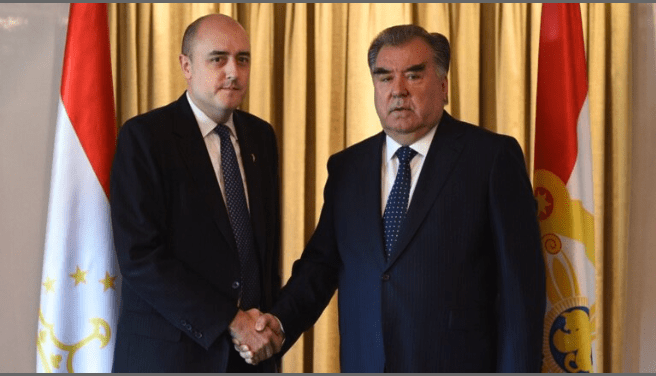In Meeting with Tajik President, RFE/RL Presses For Media Freedom And Accreditation

WASHINGTON – Only days after authorities in Tajikistan responded piecemeal to the accreditation requests of nearly 20 Radio Free Europe/Radio Liberty (RFE/RL) journalists and staff, RFE/RL President Jamie Fly met with Tajik President Emomali Rahmon to press for the rights of Tajik audiences to receive objective reporting, and for RFE/RL journalists to work freely and without intimidation.
Fly told the president that “RFE/RL adheres to the highest journalistic standards, and will not compromise these standards because of government threats or intimidation.” Regarding accreditation of colleagues with RFE/RL’s Tajik Service, known locally as Radio Ozodi, he said he “cannot accept a situation where RFE/RL journalists are selectively accredited or only accredited for short durations,” and indicated that if the issue was not resolved expeditiously, RFE/RL would need to review its operations in Tajikistan.
Fly reported that “President Rahmon indicated the important nature of Radio Ozodi’s work and stated that he wanted Ozodi to remain in Tajikistan.” After the meeting, Fly called on the Tajik Foreign Ministry and other agencies “to implement the president’s instructions that all Ozodi journalists be accredited and that all harassment of our journalists cease.”
The meeting, which took place in Zurich, Switzerland, at RFE/RL’s request during a swing by the Tajik president through Europe, came days after the Tajik Foreign Ministry failed to fully grant the accreditation requests of 18 RFE/RL journalists and staff members whose credentials have been withheld by the ministry or were set to expire on November 1. On October 31, the ministry granted partial accreditation to seven journalists (six for six months each, one for three months), while continuing to withhold accreditation from 11 others. Tajik law requires that journalists apply to the Foreign Ministry for accreditation on an annual basis and receive responses in a timely manner.
The partial approvals “fail to recognize the fundamental right of our journalists to work,” Fly said in a letter to Foreign Minister Sirojiddin Muhriddin following the October 31 decision. He urged the ministry “to accredit fully all Ozodi journalists immediately and let them do their jobs.”
The OSCE, The Washington Post, the Committee to Protect Journalists, and local Tajik media advocacy groups have decried the government’s withholding of accreditation as a violation of media freedom and a means of censorship. Members of the U.S. Senate and House of Representatives issued letters to the Tajik president criticizing the government’s attempt to use accreditation to restrict Radio Ozodi’s independent reporting, and stating that a failure to allow RFE/RL to operate freely could affect U.S.-Tajik relations.
RFE/RL’s Tajik Service is one of the country’s few remaining sources of independent news, attracting outsized audiences with compelling reporting on issues not otherwise covered by state-run media. It has Tajikistan’s most popular YouTube channel (828,000 subscribers; 195 million video views in FY2019) and Facebook page (184,000 followers; 14 million video views in FY2019).
About RFE/RL
RFE/RL relies on its networks of local reporters to provide accurate news and information to 34 million people in 26 languages and 22 countries where media freedom is restricted, or where a professional press has not fully developed. Its videos were viewed over 2.6 billion times on Facebook and YouTube in FY2018. RFE/RL is an editorially independent media company funded by a grant from the U.S. Congress through the U.S. Agency for Global Media.
—-
FOR MORE INFORMATION, CONTACT:
Joanna Levison in Prague, levisonj@rferl.org, +420.221.122.080
Martins Zvaners in Washington, zvanersm@rferl.org, +1.202.457.6948